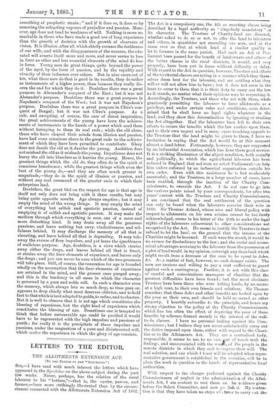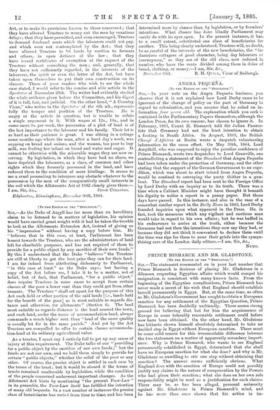LETTERS TO THE EDITOR.
THE ALLOTMENTS EXTENSION ACT.
[To THE EDITOR OF THE " SPECTATOR."
have read with much interest the letters which have appeared in the Spectator on the above subject during the past few weeks. Never, perhaps, has the relation of the rural labourer to his "betters,"—that is, the squire, parson, and farmer,--been more strikingly illustrated than by the circumstances connected with the Allotments Extension Act of 1882.
The Act is a compulsory one, the 4th or enacting clause being described by a legal authority as "singularly mandatory" in its character. The Trustees of Charity-land are directed, whether asked to do so or not, to offer the land to labourers and others, in quantities not exceeding one acre, and at the same rent as that at which land of a similar quality is let to farmers in the same parish. Had such an Act of Parliament been passed for the benefit of landowners and others of the better classes in the rural districts, it would, and very properly, have been put in force without difficulty or delay. With regard to the Act in question, however, Trustees and others of the territorial classes are acting in a manner which they themselves deem best for the labourer, and are settling what they will or will not allow him to have ; but it does not seem in the least to occur to them that it is their duty to carry out the law as it stands, no matter what their opinions may be respecting it. Accordingly, the Trustees, and those who act with them, while graciously permitting the labourer to have allotments as .a privilege, and under certain rules and conditions, seem determined that he shall have no legal rights whatever in the land, and they show this determination by ignoring or evading the Act altogether. Had the labourers been left to their own efforts to secure the benefits which the law confers upon them, and to their own urgent and in many cases touching appeals to the Trustees that the land might be given to them, I have no hesitation in saying that the Act would be at this moment almost a dead-letter. Fortunately, however, they are supported by an influential Association, which has done them good service. It is a striking illustration of the abject condition, both socially and politically, to which the agricultural labourer has been reduced in England, that not'even an act of Parliament can help him unless enforced by an influential organisation outside his own order. Even with this assistance he is but moderately successful ; and the Trustees, in a large number of cases, have been enabled, . through the inaction of the Charity Commissioners, to override the Act. I do not care to go into the various points raised by your correspondents, for after two years' contest with the Trustees and Charity Commissioners, I am convinced that the real settlement of the question can only be found when the labourers exercise their vote in 1886. Sir Thomas Acland, whose wise and liberal policy with respect to allotments on his own estates cannot be too freely acknowledged, seems in his letter of the 20th to make the legal rights of the labourers subservient to other considerations not recognised by the Act. He seems to justify the Trustees in their refusal to let the land, on the ground that the income of the Charities might be lessened. If such were the result, it would be no excuse for disobedience to the law ; and the social and economical advantages accruing to the labourer from the possession of a plot of land would, in my opinion, outweigh any drawback which might result from a decrease of the sum to be spent in doles, &c. As a matter of fact, however, no such danger exists. The men are anxious and willing to pay a rent sufficient to guard against such a contingency. Further, it is not with this class of careful and conscientious managers of charities that the greatest difficulties have been found ; but the most obstinate Trustees have been those who were letting lands, by no means at a high rent, to their own friends and relatives. Sir Thomas considers that these doles and other benefits are looked upon by the poor as their own, and should be held as sacred as other property. I heartily subscribe to the principle, and hence my strong objection to the policy of the Charity Commissioners, which has too often the effect of depriving the poor of these benefits by schemes framed mainly in the interest of the wellto•do classes. I have no personal feeling against the Commissioners; but I believe they can never satisfactorily carry out the duties imposed upon them, either with regard to the Charities or to the Allotments Act. They are a centralised body, responsible, it seems to me, to no one, ut of touch with the feelings, and unacquainted with the wan% , of the people in the remote districts in which they seek to impose their will. The real solution, and one which I trust will be adopted when representative government is established in the counties, will be to place the work in question in the hands of representative local authorities.
With respect to the charges preferred against the Charity Commissioners of neglect in the administration of the Allotments Act, I am content to rest them on he widence given before the Select Committee, and now pu lish:d. My contention is that they have taken no steps wl Ltevar to carry out the Act, or to make its provisions known to those concerned ; that they have allowed Trustees to weary out the men by vexatious delays ; that they have permitted, and even encouraged, Trustees to demand forehand rents which the labourers could not pay, and which were not contemplated by the Act ; that they have allowed Trustees to let lands by auction to farmers and others, in open defiance of the law ; that they have issued certificates of exemption at the request of the Trustees without consulting the men ; and, generally, that they have not sufficiently regarded, in the interests of the labourers, the spirit or even the letter of the Act, but have taken upon themselves to put their own construction on its clauses. Those of your readers who wish to see the whole case stated, I would refer to the concise and able article in the Spectator of November 29th. The writer had evidently studied the whole evidence given before the Committee, and his digest of it is full, fair, and judicial. On the other hand, "A Country Vicar," who writes in the Spectator of the 6th ult., represents fully the temper and position of the Trustees. He is angry at the article in question, but is unable to refute a single argument in it. With wages at 12s., 10s., and in some cases 9s. per week, the possession of a plot of land is of the last importance to the labourer and his family. Their lot is as hard as their patience is great. I was sitting in a cottage some months ago where the man, after a hard day's work, was supping on bread and onions, and the woman, too poor to buy milk, was feeding her infant on bread and water and sugar. It cannot be otherwise with the miserable wages they are now receiving. By legislation, in which they have had no share, we have deprived the labourers, as a class, of common and other rights which they formerly possessed in the land, and have reduced them to the condition of mere hirelings. It seems to me a cruel proceeding to interpose any obstacle whatever to the possession by the men of the comparatively small interests in the soil which the Allotments Act of 1882 clearly gives them.— I am, Sir, &c., JESSE COLLINGS.
Edgbaston, Birmingham, December 30th, 1884.











































 Previous page
Previous page